Bug Bounty Course

Are You Looking for Best Bug Bounty Course Online?
We are one of India’s only company providing the best online bug bounty course and training.
In our Bug Bounty Course, you are not only just getting Training but an Internship as well,
At the end of our 6-month training program, you will be an experienced & certified Web Application Security Professional.
Fill out the form below to know more about the training.

Please note that it's not a Free Training Program. To Enrol in the Training Program You will have to Pay the Fees as communicated by our Course Advisors.
Our Program
Highlights:
Internship + Training
360° Career Development
Online Training
Regular Live Classes
6 Months Training
Training Language: English
Internship + Training
360° Career Development
Online Training
Regular Live Classes
6 Months Training
Training Language: English


















































Check Our Placements!
Benefits of Our Bug Bounty Course Online
Get an Internship Along with Training
Job Placement Assistance
Job-Oriented Training Program
Regular Live + Recorded Sessions
Dedicated Mentor
Online Training
Get Cyber Security Certificate
Get Threat Hunting Training Certificate
Work with Experienced Professionals
Earn Rewards and Awards
Get Recognized
Work on Cybercrime Cases
Earn While You Learn
360° Personality Development
Get paid by Finding Vulnerabilities
Unlimited Guidance
We are Trusted & Rated
by over 500+ Satisfied Students!
Bhavesh NaikAugust 18, 2023A Good and realiable place to start your Cybersecurity career and gain experience. Mentor's here are good and helpful which assist you in your journey.Aravind TAugust 17, 2023I done my training on Cyber forensics. It's a very wonderful and grateful course.Thank you CyberSapiens.chidanand KallibaddiAugust 17, 2023I had the privilege of interning as a VAPT trainee at Cyber Sapiens, and it was an incredible experience. The team's expertise, hands-on learning, and collaborative atmosphere made it a truly valuable journey into the world of cybersecurity. I'm grateful for the skills and knowledge I gained during my time there.Roshan Ali ShaikAugust 4, 2023I have been an Cyber Security intern trainee at Cyber Sapiens for 6 months and its the best experience one can get in the cyber security field. The internship has given a great kick start to my career in Cyber Security and Bug hunting. The mentors at the company are well versed in the field and are great at teaching and solving doubts. They give you a really good path to follow by which you can develop your knowledge and skills. I am very much satisfied by the company. They provide you with mock interviews to face real world interviews and guide you for making a better future. A novice in this field can become an expert if one works hard enough by going through this training. I strongly recommend anyone that is giving a thought of joining the company.BRIAN MAugust 2, 2023I learned a lot working with CyberSapiens as an Intern. Enjoyed as well as learned a lot over there. I would recommended any beginners to join CyberSapiens as it provides the best hands on training in ethical hacking.rao anushJuly 31, 2023The over all internship training was good.Studied more about cybersecurity and what are the types of attacks takes place.Mebin SankarJuly 27, 2023My internship with CyberSapiens was excellent! Valuable experience, supportive team, and great flexibility. Highly recommended!Jeel KhatiwalaJuly 25, 2023The experience in internship was something which I have never experienced earlier, The 6 month of training and internship help me to grow especially in Cyber Security Domain, When I Joined initially I was just script kiddie and After completion of 6 month it totally transformed me to Cyber Security professional and Help me stand different and one level up from the others around me in personal and professional life.Mukesh KumarJuly 24, 2023I had an incredible learning experience during my internship at Cybersapiens LLP as a Red Teamer. The team's expertise and guidance helped me develop practical skills in cybersecurity and ethical hacking. The hands-on projects challenged me to think creatively and tackle real-world security scenarios. I am grateful for the opportunity to work with such talented professionals and contribute to their impactful work in the cybersecurity domain.Google rating score: 4.9 of 5, based on 204 reviews
Take a look at the Acheivements of Our Ethical Hackers
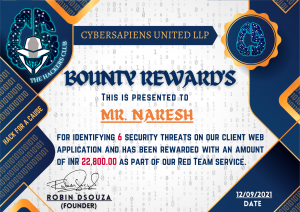

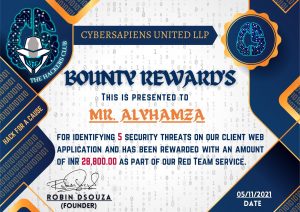
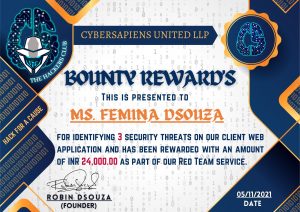
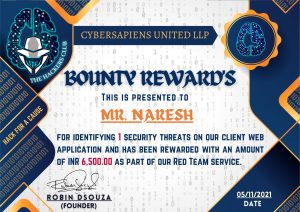
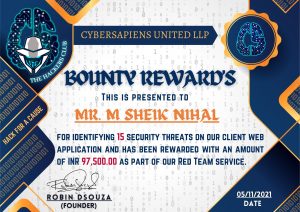
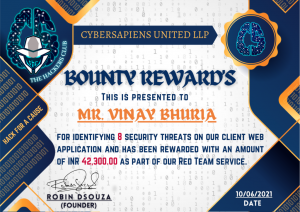
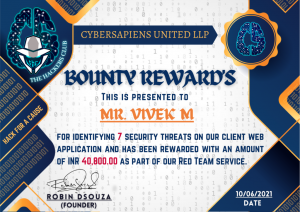
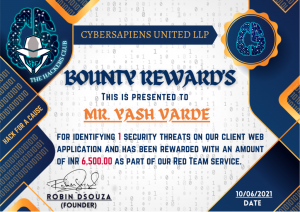
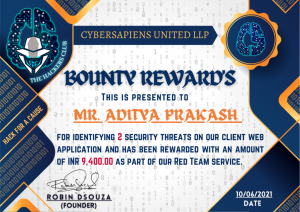
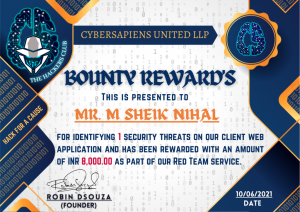
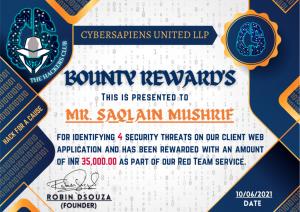

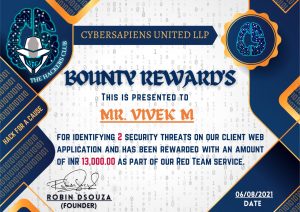

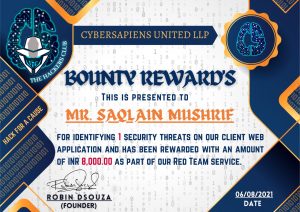
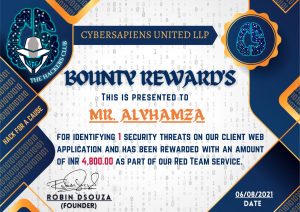
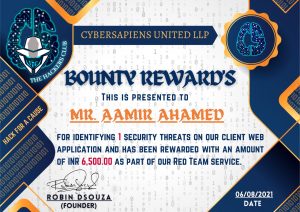
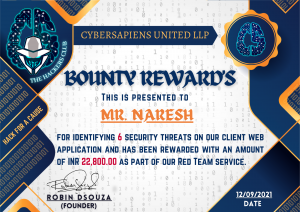
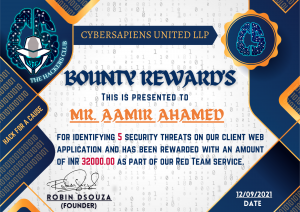
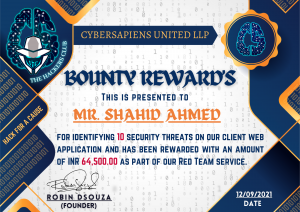
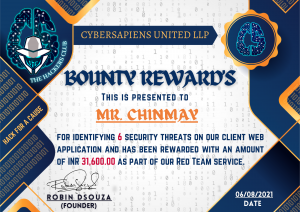
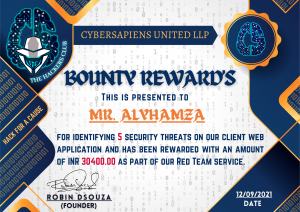
Interested in Complete Cyber Security Internship + Training Progam?
Program Curriculum
We provide a very unique Industry Oriented Curriculum from basics to an advanced level.
The training covers 13 Modules which are divided into 3 Chapters – Basic, Advanced and Specialization.
Chapter 1: Basic
This chapter covers all the basic topics that companies expect in an individual. These topics help you to make your base strong in the Cyber Security domain.
Module 1 – Foundation to Cyber Security
- Why Cyber Security & How it Works in an organization?
- CIA – The Three Pillars of Cyber Security
- Cyber Attacks & Data Breaches
- Classification of Information
- Domains in Cyber Security
- Job Roles and Designations in the organizations
- Controls, Standards & Regulations
- Protocols & Port Numbers
- Cryptography
- Digital Signatures
Chapter 2: Advance
This chapter covers all the advance topics of the cyber security domain from an industry perspective which is required for every cyber security professional. It especially covers the four primary topics – GRC, SOC, VAPT and Cloud which are the core domains in Cyber Security. This Chapter will help you in gaining a good weightage to your profile.
Module 2 – Vulnerability Management & Penetration Testing
- Introduction to VAPT
- Types of Pentesting
- VAPT Targets & Tools
- VAPT Report Writing & Documentation
- Skills required for VAPT
Module 3 – Network Security
- Network Security Concepts
- Defense in Depth
- Network Security Devices - DLP, Firewall, IDS-IPS, AV
- Network Segmentations
- Protocols - SSL, TLS, VPN
- Zero trust approach to network security
- Network Monitoring
Module 4 – Web Application Security
- Web Application Protocols
- OWASP Top 10
- Using Burp Suite Tool for Web VAPT
- Web VAPT Tools & Methods
- Information Disclosure Vulnerability
Module 5 – API Security
- Importance of API & API Pentesting
- API pentesting VS Traditional Web Pentesting
- API Documentation
- Postman Tool Introduction
- LAB Setup Demonstration
Module 6 – Mobile Application Security
- Introduction To Android & Android Architecture
- Introduction To IOS & IOS Architecture
- OWASP Mobile TOP 10
- Mobile Application Pentesting Process
Module 7 – Network VAPT & Attacks
- Network VAPT Types
- Tools for Network VAPT - Qualysis & Nessus
- Network Traffic Analysis
- Performing VA using nmap
- Creating automated nmap scripts for scanning
- Banner Grabbing Attack
- User Enumeration Attack
- Bruteforce Attack
- Password Cracking Attack
- Finding & Analysing CVE for Vulnerable services
Module 8 – Governance Risk & Compliance
- Introduction to GRC
- ISO 27001
- PCI DSS
- HIPAA
- NIST
- GDPR
- Data Privacy
- SOC Audits – SSAE16/SOC 1, SOC 2 & SOC 3
- Risk Management
- Security Audits
- Business Continuity
- Third Party Risk Management
- Compliance Management
Module 9 – Security Operations Centre (SOC)
- SOC Fundamentals
- SOC Team Roles and Responsibilities
- Security Information & Event Management
- Recognizing Security Incidents and Events
- Threat Intelligence
- Incident Detection & Response
- MITRE ATTACK
- Incident response procedures
- Security Alerts & Alarms
- Overview of Splunk
- Splunk architecture
- Installation of Splunk (Windows & Linux)
- Usage of Splunk in log analysis
Module 10 – Cloud Security
- Introduction to Cloud security
- Cloud Pentesting Methodology
- AWS Cloud Security
- Azure Cloud Security
Chapter 3: Specialization
This chapter is where you will be gaining the skills of a Penetration Tester for performing Web + API & of a Penetration Tester for performing Web + API & Mobile Pentesting and you will be working on live Mobile Pentesting and you will be working on live targets hunting for vulnerabilities. targets hunting for vulnerabilities.
Module 11 – Web Application VAPT & Attacks
- XSS & HTML Injection
- SQL Injection
- CORS & HSTS
- Host Header Injection & Password Reset Poisoning
- SSRF
- File Upload Vulnerabilities, LFI, RFI & File Path-traversal vulnerabilities
- CSRF
- Business Logic Vulnerabilities
- Business Logic Vulnerabilities
- XXE
- Subdomain Takeover & Broken Link Hijacking,
- Buffer Overflow & Long Password DoS Attack
- RCE & Command Injection
Module 12 – RCE & Command Injection
- Broken Object Level Authorisation
- Broken Authentication
- Broken Object Property Level Authorisation
- Unrestricted Resource Consumption
- Broken Function Level Authorisation
- Unrestricted Access to Sensitive Business Flows
- Server-Side Request Forgery
- Security Misconfiguration
- Improper Inventory Management
- Unsafe Consumption of APIs
Module 13 – Mobile Application (Android & iOS) VAPT & Attacks
- Setup of Tools in (Windows, Kali, Mac)
- Static & Dynamic Analysis (Android) Methods
- Static & Dynamic Analysis (iOS) Methods
- Insecure Data Storage
- Sensitive Data Exposure
- Input Validation and Manipulation
- Improper Platform Usage
- Insecure communication
- Insecure Authentication & Authorization
- Insufficient Cryptography & Poor Code Quality
- Code tampering
- Reverse Engineering
- Extraneous Functionality
*Download the brochure to better understand the course curriculum, structure and pricing structure of the training program.
Not only this we have got Additonal Suprises for you all!
Get these 2 additional courses along with the main Training Program…

Get CEH v12 Course of 40+ Hours for FREE along with this Program and register yourself as a Certified Ethical Hacker for V12

Get our Bug Hunting Essential Course which covers around 20 Web & API Bugs to become a Bug Hunter for FREE

Get In Touch
By filling this form ↓
FAQ's
A bug bounty program is a cybersecurity initiative where organizations offer monetary rewards, also known as bounties, to individuals or groups who discover and responsibly disclose vulnerabilities or weaknesses in their software, applications, systems, or networks. Bug bounty programs are important for organizations for several reasons:
Enhanced Security: Bug bounty programs provide an additional layer of security testing by leveraging the skills and expertise of independent security researchers who actively search for vulnerabilities. This helps organizations identify and fix vulnerabilities before they can be exploited by malicious actors, thereby enhancing the overall security posture of their assets.
Increased Vulnerability Detection: Bug bounty programs allow organizations to tap into a global talent pool of ethical hackers and security researchers who can identify vulnerabilities that internal security teams may have overlooked. This helps organizations discover a wider range of vulnerabilities and obtain valuable insights into potential attack vectors.
Cost-Effective: Bug bounty programs can be a cost-effective approach to identifying vulnerabilities, as organizations pay only for valid vulnerabilities that are reported and confirmed rather than maintaining a full-time internal security team. The rewards offered through bug bounty programs are typically lower than the potential costs of a security breach or data breach, making it an attractive option for organizations to proactively identify and fix vulnerabilities.
You can enroll in a bug bounty course through CyberSapiens.Bug bounty courses may have varying prerequisites, depending on the level and complexity of the course. Common prerequisites may include basic knowledge of programming languages (such as Python, JavaScript, etc.), web technologies (such as HTML, HTTP, etc.), and cybersecurity concepts and tools.
1st Level:
- Admin panel disclosure & Use the default username and password
- Missing SPF
- Google Dorking
- WordPress Vulnerabilities
2nd Level:
- XSS
- HTML Injection
- Open Redirection
- Host Header Injection
- Parameter Tampering
- CORS
- Clickjacking
- Sniffing
3rd Level:
- No Rate Limit (OTP bypass)
- Information Disclosure
- SSRF
- CSRF
- XXE
- Business Logic Bugs
- JWT Token
- Subdomain Take over
- S3 Bucket Enum
- RCE
- SQL Injection
- IDOR
- Long Password DOS Attack
- Buffer Overflow
- HTTP Strict Transport Security (HSTS)
- Session Fixation
- Session Hijacking
- Broken Link Hijacking
- Command Injection
- File upload
- LFI/RFI
- Network Pentest
- Active Directory Enumeration
- API Pentesting
CyberSapiens’ bug bounty course is strictly instructor based. However, no spoon-feeding will be done.
- Get an Internship Along with Training
- Job Placement Assistance
- Job-Oriented Training Program
- Regular Live + Recorded Sessions
- Dedicated Mentor
- Online Training
- Get Cyber Security Certificate
- Get Threat Hunting Training Certificate
- Work with Experienced Professionals
- Earn Rewards and Awards
- Get Recognized
- Work on Cybercrime Cases
- Earn While You Learn
- 360° Personality Development
- Get paid by Finding Vulnerabilities
- Unlimited Guidance
Having a basic understanding of cybersecurity concepts and programming fundamentals can be beneficial when taking a bug bounty course.
You can learn about the latest techniques through our aid right away. All you need to do is connect with us to enroll in the program.
Bug bounty hunters typically use a variety of methodologies and techniques to find vulnerabilities in web applications, networks, and systems. Some common methodologies include
Manual Testing: Bug bounty hunters perform manual testing, which involves a thorough inspection and analysis of web applications, networks, or systems to identify vulnerabilities. This may include analyzing the application's source code, configurations, data flow, and business logic to identify potential vulnerabilities.
Automated Scanning: Bug bounty hunters use automated scanning tools that scan web applications, networks, or systems for known vulnerabilities, misconfigurations, and other security weaknesses. These tools can quickly identify common vulnerabilities such as SQL injection, cross-site scripting (XSS), and cross-site request forgery (CSRF) vulnerabilities.
Fuzz Testing: Fuzz testing, also known as fuzzing, involves sending malformed or unexpected inputs to an application to trigger unexpected behaviors and uncover potential vulnerabilities. Bug bounty hunters may use fuzzing tools or develop their own custom fuzzing scripts to identify vulnerabilities caused by input validation or parsing errors.
Bug bounty hunters typically target various types of vulnerabilities in web applications, networks, and systems. Some common types of vulnerabilities that bug bounty hunters may focus on include:
Cross-Site Scripting (XSS): XSS vulnerabilities occur when an application allows untrusted data to be injected into web pages, which can allow attackers to execute malicious scripts in the context of other users' browsers. XSS vulnerabilities can be identified and exploited by injecting malicious code into input fields or parameters of a web application and observing the output for script execution.
Cross-Site Request Forgery (CSRF): CSRF vulnerabilities occur when an attacker can trick a user into performing unwanted actions on a different website where the user is authenticated. CSRF vulnerabilities can be identified and exploited by creating malicious requests automatically triggered when a user visits a malicious website while being authenticated on another website.
Remote Code Execution (RCE): RCE vulnerabilities occur when an attacker can execute arbitrary code on a target system or server. RCE vulnerabilities can be identified and exploited by injecting malicious code or payloads into input fields or parameters of a web application or system and observing the response or behavior for code execution.
Staying updated with the latest trends and developments in the bug bounty field is crucial for bug bounty hunters to continuously improve their skills, stay relevant, and discover new vulnerabilities. Here are some ways to stay updated:
Follow Bug Bounty Platforms and Communities: Stay active on bug bounty platforms and communities, such as HackerOne, Bugcrowd, and Open Bug Bounty, where bug bounty programs are hosted. These platforms often share updates on new programs, vulnerabilities discovered, and best practices.
Follow Security Researchers and Bug Bounty Hunters on Social Media: Follow renowned security researchers, bug bounty hunters, and cybersecurity influencers on social media platforms like Twitter, LinkedIn, and GitHub. They often share their findings, techniques, and updates related to the bug bounty field.
Participate in Bug Bounty Events and Conferences: Attend bug bounty events, conferences, and workshops to learn from experts in the field, network with other bug bounty hunters, and stay updated with the latest developments. Many bug bounty platforms and organizations host events and conferences focused on bug bounty hunting.
At CyberSapiens, we prioritize providing valuable training services to our clients. We do not offer refunds for any of the payments made against the enrolments in any circumstances.
However, we understand at times certain unexpected situations may arise and therefore in such cases, participants have the flexibility to utilize their paid fees towards our services within the next 8 months.
In the event a refund is requested, it will be considered for a small portion of the amount only. Thus, we encourage participants to take advantage of this opportunity and engage with our services within the specified timeframe.








